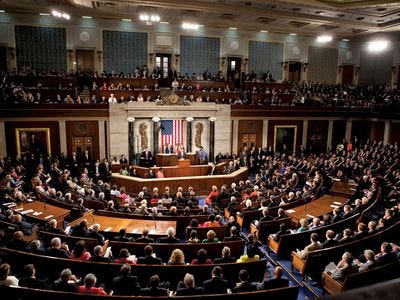
As the 2024 Congressional Race nears its end, the voter results have decidedly given the Republican Party a majority in both the Senate and House of Representatives. In the Senate, Democrats have lost three seats while the Republicans have gained three seats. The GOP now has 52 seats, two over the required 50 to claim the majority. The GOP also gained a seat in the House of Representatives and now hold 201, while the Democratic Party lost one seat, currently filling 180.
The Senate race is not called yet, and states still without definitive Senate calls from the Associated Press include Pennsylvania, Maine, Nevada, Arizona, Michigan and Wisconsin, although all show a degree of certainty in which way they will swing.
Not all states went blue or red, however, and both Maine and Vermont will have an unaffiliated candidate represent them in the Senate. In Vermont, incumbent Bernie Sanders has been elected to his fourth term and Angus King Jr. shows a promising lead in Maine — 82% of the vote has been reported, according to the Associated Press.
As the Republican Party now holds a majority in the Senate and is leaning towards a majority in the House, Joel Winkelman, an Assistant Professor of Government for Hamilton College, believes that there now exists “a smooth path to implementing a presidential agenda” that specifically pushes forward the GOP’s preferred approach towards foreign policy. The changes in foreign policy expected by Winkelman include actions such as “notably distancing ourselves from Europe and NATO; support for an expanded war in the Middle East; deteriorating trade relationships around the world” and “the declining support for international organizations that were key sites of U.S. influence.”
Winkelman also anticipates domestic change due to his opinion “that the executive branch itself has become much more politicized and much less able to execute public policy. As regulations become more unclear, I expect the next four years to have an above-average share of corruption and fraud scandals both in the public and private sectors.” This includes the “continued growth in inequality and a worsening of conditions for Americans,” while “the people who are at the top of the economic order seek gains by attempting to create social divisions out of the deteriorating conditions of everyday life for the majority of Americans.”
Jasmine Bonilla ’28, President for the Class of 2028, is concerned that “now that the Senate, House and executive branch are all under Republican control, I can’t help but feel concerned about how certain policies, especially those concerning bodily autonomy, may be impacted.”
In addition to her worries about policy-making, Bonilla mentions that even though “the results don’t align with my expectations, I recognize the many factors that contributed to this outcome” including a lack of candidates most people deem favorable for office. Bonilla is discontented with “the idea that presidential elections are about choosing the lesser of two evils,” which many felt was true in the Congressional races as well. Winkelman shares Bonilla’s mindset, and encourages those who are not happy with the outcome of the election to focus on “resisting the distraction of being told to look down on someone else” as “this election was a brilliant demonstration of ‘divide and rule’ politics” in which people voted against one candidate rather than in favor of one.
In Bonilla’s home state of Florida, where a red lean is usually expected, she reveals her observation on “how nearly every blue county in Florida hosts a major university.” This phenomenon provides optimism to Bonilla and many other young Americans who are “hopeful that future elections will bring a shift toward more progressive representation” and that “future candidates from both parties will emerge as leaders who are truly committed to the well-being of all Americans.”
On a more localized level, Democrat John Mannion has been announced as the Representative for the 22nd Congressional District, which Hamilton College is a part of, marking the removal of Republican Brandon Williams from office and the election of a Democrat to a House seat that has been filled by a Republican candidate for the past decade.

















